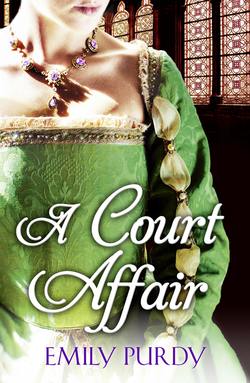Читать книгу A Court Affair - Emily Purdy - Страница 12
6 Amy Robsart Dudley
ОглавлениеCumnor Place, Berkshire, near Oxford Sunday, September 8, 1560
As hot tears roll down my face, I reach for the medicine bottle and take another calming sip. What a strange sensation it brings! As if I were floating above myself, above the pain, like the notes of a song hovering above just-plucked and still-vibrating lute strings. I have the most peculiar feeling of being outside myself, and behind myself, as if each time I move, I have to pause and wait a moment for my body to catch up with my soul. Or is it the other way around, and my mind that must rush to catch up with my body? What a curious notion! I am filled with the oddest fancies! I can’t help but laugh, even though it makes me feel as if Death were playing my ribs like the ivory keys of a virginal, but the medicine numbs it, and there is that strange delaying sensation; even though Death’s fingers strike the keys, the sound of the notes lags behind a moment or two. I take another sip, and the chords of pain are muted even more, as if I have run too far away to hear them as more than a distant, wind-borne melody. The pain is my fool now, and I am not the fool of my pain. I giggle and take another sip of that amber liquid, and now I don’t even mind the bitter taste that burns my throat as it courses down; I welcome it as if it were my saviour. Salvation in a bottle, the nostrum peddlers should call this magic brew! And after another sip I lie back on my bed, close my eyes, and let my mind wander where it will …
When last I visited the crumbling, overgrown ruins of Syderstone, though they were no longer my own, I put on my wedding gown and went out, barefoot, with my hair all a-tumble down my back, and walked across the meadow, just as I had on my wedding day, picking myself a bouquet of buttercups as I went. What a strange sight the sheep must have thought me as they fled baa-ing before me, pausing oft to look back and stare before they fell to munching clover and thistles again. I know it sounds silly, but I wanted to see what it would be like, how it would feel, to see if by wearing my wedding gown again I could magically recapture even a little of the joy of that day, as if an echo of it might linger, hovering in the air like a butterfly, and I could run after it and catch it in my hands. I am a silly, fanciful creature, I know. And the dress made no difference at all. Wearing it again brought me only sorrow; it had become a symbol of tarnished hopes and dead and broken dreams that could never be revived or repaired. Nothing turned out the way I thought it would. I perched upon the old, moss-festooned stone where the shepherd sometimes sat and buried my face in my hands and wept. Both my parents were gone to their graves, and my stepbrothers and sisters all had their own busy lives, with homes and families of their own and no time or care to spare for me and my troubles. The adored darling, the spoiled beloved, now had nothing. There was no one to love and adore her any more, not even a home to call her own, she had lost her highborn husband to the Queen, and cancer was slowly stealing her life away.
The dress remained the same, but the woman who wore it had changed; it now hung loose upon my frame, and every dream that eager, smiling, happy, young bride had had that day when she walked across the meadow to serve milk to her guests in cups shaped like breasts had come to nothing or gone horribly, nightmarishly wrong. I wanted to run backward, racing, hurtling, across time, and catch hold of that hopeful young girl on the threshold of the church, draped with evergreen boughs and bows and ribbons of gold and cream, and beg her not to marry Robert Dudley. To slap and shake some sense into her if I must, and let her gaze fill upon me and know what her life would become if she persisted. I would even tear open my bodice and let her see the ravages of this disease, the ugly, seeping wound left by the worm of sorrow burrowing deeply into my breast, for I truly believe my sadness opened the door to let this disease into my life. But I knew that, even if I could, that confident, headstrong seventeen-year-old I used to be would merely laugh in my face, toss her blond curls, and shrug off my urgently grasping hands, along with my dire warnings of doom and gloom, and tell me that none but God would ever tear her and her beloved Robert apart. She would turn her back on me and, with her head held high, walk proudly up to the altar and take his hand in marriage, just as she did when her wise old father warned her just before she passed through the arched portal beneath the evergreen boughs, “First love is rarely evergreen love, my dear.” The Amy I used to be would never have listened to the Amy I am now. It’s folly to even think so.
